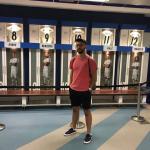Support
I am an Economics and Global Studies Major and I had the opportunity to study abroad in Denmark during Fall 2018. This was my first study abroad program and with the help of the Cabot Family travel research grant, I was able to travel to Madrid, Milan, Paris, Brussels, Thessaloniki, Geneva, Hamburg, and Stockholm, where I was able to do research on Islamophobia. My SYE for Global Studies examines the effects of Islamophobia on Muslim populations within the Western world. With the vast variety of study abroad opportunities that SLU provides, I chose Denmark for its policy on religious-based discrimination and its dealing with Islam. In contrast to most other European nations, Denmark and Islam have had very minimal contact with each other, and that is mostly down to the participation (or lack thereof) of Denmark within the World Wars, as well as its colonial framework lacking roots within societies of Muslim origin. Contrasting this with Germany, who leaned towards Turkish immigrants to help them rebuild after the damage sustained in the World Wars.
Since Islamophobia has quite a large dimension and multifaceted complexities, I focused on the role played by Muslim football players in helping curb Islamophobia within the cities I had visited. With the funding, I was able to attend the following football games:
FC Midtjylland vs Brondby
Kobenhavn vs Zenit St. Petersberg
Kobenhavn vs Slavia Prague
Real Madrid vs Levante
AC Milan vs Sassuolo
With the funding, I was able to get private club tours that would enable to question the tour guides about Islamophobia and its effect within clubs. I was also able to meet fan club members and had casual chats with them about their Muslim players on the team and how they felt about them. I felt this to be an integral part of my research as I was able to collect first-hand accounts of supporters and their feelings of Islam on the team and in society overall. Each of the teams mentioned above had 1 or more Muslim player(s) on their team and hence I was able to gather feedback on their performances compared to their non-muslim teammates. I felt as though this insight gave me a good understanding of how much Islam was considered a part of a players intersectionality when the game was won or lost. There were a few roadblocks that I did hit in my research, most of which were centered in Paris, the focus of my SYE. My club tour at PSG was cut short as I started inquiring about the PSG academy's illegal poaching of adolescent football prospects from former French colonies, as well their alleged quotas for non-white academy players. It comes as no surprise that FIFA fined PSG with regards to their quota system as reported by the New York Times on the 8th of November.
Apart from football, I was able to network with different Muslim organizations within the countries I had visited. In Denmark, I met with Niddal Jabbari who is a co-founder of the group MINO, a multi-functional group that advocates for ethnic minority Danes. Similarly, I met with FEMYSO members in Brussels to have a conversation regarding Molenbeek, the future of Islam not only in Belgium but also in the entirety of Europe. I was also able to meet and converse with scholars such as Jesper Petersen, a professor at the Lund University, about the Algerian-French intersectionality as well as the role of Harkis (Algerians who fought on behalf of the French in the Battle of Algiers) in postcolonial France.
In sum, my research focused on Islam in Europe and the different ways the Islamic intersectionality interacts with the European identity, and through the funding I received from the Cabot family, I was able to explore this not only in different cities but also, I was able to explore this in different frameworks of Muslim populations within European societies.
